The heavy doors of the Sistine Chapel loomed, ancient and unyielding, as if guarding centuries of secrets. Beneath Michelangelo’s frescoed ceiling, the silence was thick with anticipation. Cardinals in scarlet robes moved with solemn dignity, each step echoing a sense of divine responsibility. Outside, the world waited — breathless, anxious, hopeful. The papal conclave of 2025 had begun. According to Church law, the cardinals would vote twice each day until one man received a two-thirds majority. That meant ninety votes. Ninety men had to agree — not on policies or platforms, but on a soul they believed could carry the weight of Peter’s keys.
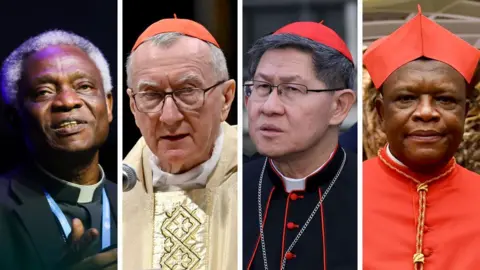
Getty Images
Pope candidates (left to right) Cardinal Peter Kodwo Appiah Turkson, cardinal Pietro Parolin, cardinal Luis Antonio Gokim Tagle, and cardinal Fridolin Ambongo Besungu
Who will be the next pope?
The decision will be made when the College of Cardinals begins meeting in conclave from 16:30 on 7 May in the 15th Century Sistine Chapel.
It will involve 133 cardinals aged under 80, who will debate and then vote for their preferred candidate until a single name secures the support of two-thirds of them.
With 80% of the cardinals appointed by Pope Francis himself, most are not only electing a pope for the first time, but will offer a broad global perspective.
For the first time in history, fewer than half of those given a vote will be European.
And although the college may be dominated by his appointments, they were not exclusively "progressive" or "traditionalist".
Could the cardinals elect an African, an Asian or even an American pope, or might they favour one of the old hands of the Vatican administration?
Here are some
IN PICTURES:
Symbolism on show as Pope lies in open coffin
EXPLAINER:
Key candidates in an unpredictable contest to be the next Pope
PROFILE:
Acting head of the Vatican Cardinal Kevin Farrell
VISUAL GUIDE:
How the next Pope is chosen by secret vote
Pietro Parolin
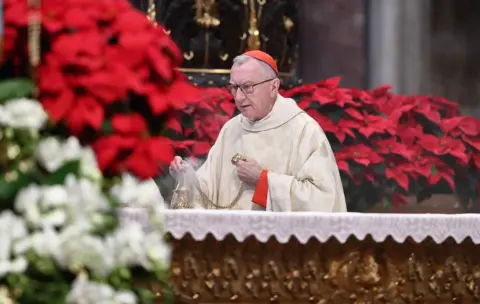
Getty
Nationality: Italian
Age: 70
Softly spoken Italian Cardinal Parolin was the Vatican's secretary of state under Pope Francis – making him the pope's chief adviser. The secretary of state also heads the Roman Curia, the Church's central administration.
Having acted effectively as deputy pope, he could be considered a frontrunner.
He is viewed by some as more likely to prioritise diplomacy and a global outlook than the purity of Catholic dogma. His critics consider that a problem, while his supporters see a strength.
But he has been critical of the legalisation of same-sex marriage around the world, calling a landmark 2015 vote in favour in the Republic of Ireland "a defeat for humanity".
Catholic watchdog organisation Bishop Accountability has accused Cardinal Parolin of "suppression of abuse information" being passed to secular authorities in his role as secretary of state.
The morning light crept gently over the dome of St. Peter’s Basilica on April 21, 2025, casting long shadows across the cobbled streets of Vatican City. For most, it was just another spring morning—soft, still, sacred. But inside Casa Santa Marta, the heart of the Catholic world prepared to stop. Pope Francis, the 266th pontiff of the Roman Catholic Church, breathed his last at precisely 7:35 a.m. His frail body, once full of quiet strength, had finally surrendered after a prolonged bout of bilateral pneumonia. His death did not come entirely unexpected. He had been in and out of the hospital since February, often canceling appearances, visibly weaker each time he addressed the faithful. And yet, when the moment arrived, it shook the foundations of Vatican City.
The bookmakers may back him but Cardinal Parolin will be well aware of an old Italian saying that stresses the uncertainty of the pope-picking process: "He who enters a conclave as a pope, leaves it as a cardinal."
Some 213 of the previous 266 popes have been Italian and even though there has not been an Italian pope in 40 years, the pivot of the upper echelons of the Church away from Italy and Europe may mean there Luis A
CHINA DEAL MADE BY CARDINAL PAROLIN
IS NOT ACCEPTABLE TO THE INTERNAL |
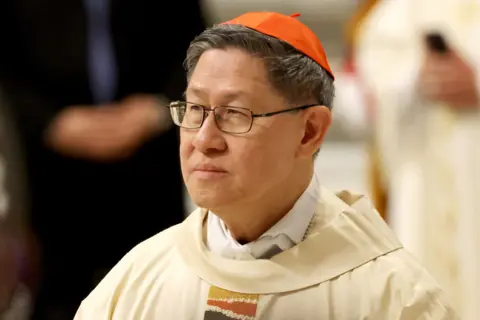
Getty Images
Robert Prevost

Getty Imagesnt
Nationality: American
Age: 69
Could the papacy go to an American for the first time?
Chicago-born Cardinal Prevost is certainly seen as having many of the necessary qualities for the role.
Two years ago Pope Francis chose Prevost to replace Marc Ouellet as prefect of the Vatican's Dicastery for Bishops, handing him the task of selecting the next generation of bishops.
He worked for many years as a missionary in Peru before being made an archbishop there.
Prevost is not just considered an American, but as someone who headed the Pontifical Commission for Latin America.
He is seen a reformer, but at 69 might be viewed as too young for the papacy. His period as archbishop in Peru was also clouded by allegations of covering up sexual abuse claims, which were denied by his diocese.
Peter Kodwo Appiah Turkson
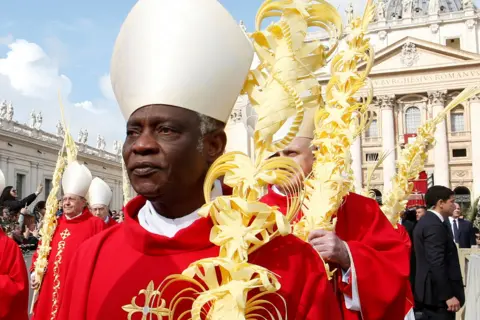
Reuters
Nationality: Ghanaian
Age: 76
If chosen by his peers, the influential Cardinal Turkson would likewise have the distinction of being the first African pope for 1,500 years.
Like Cardinal Ambongo, he has claimed not to want the job. "I'm not sure whether anyone does aspire to become a pope," he told the BBC in 2013.
Asked if Africa had a good case to provide the next pope based on the Church's growth on the continent, he said he felt the pope shouldn't be chosen based on statistics, because "those types of considerations tend to muddy the waters".
He was the first Ghanaian to be made a cardinal, back in 2003 under Pope John Paul II.
Like Cardinal Tagle, Cardinal Turkson was considered a potential pope a decade later, when Francis was chosen. In fact, bookmakers made him the favourite ahead of voting.
A guitarist who once played in a funk band, Cardinal Turkson is known for his energetic presence.
Like many cardinals from Africa, he leans conservative. However, he has opposed the criminalisation of gay relationships in African countries including his native Ghana.
In a BBC interview in 2023, while Ghana's parliament was discussing a bill imposing harsh penalties on LGBTQ+ people, Turkson said he felt homosexuality should not be treated as an offence.
In 2012, he was accused of making fear-mongering predictions over the spread of Islam in Europe at a Vatican conference of bishops, for which he later apologised.
Fridolin Ambongo Besungu
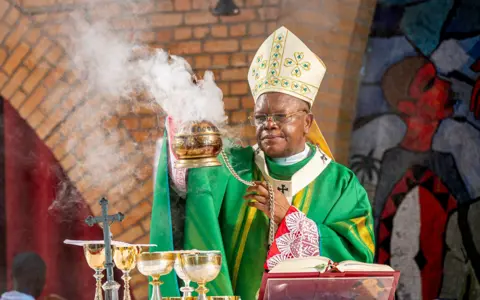
AFAdvertisement
Nationality: Congolese
Age: 65
It's very possible the next pope could be from Africa, where the Catholic Church continues to add millions of members. Cardinal Ambongo is a leading candidate, hailing from the Democratic Republic of Congo (DRC).
He has been Archbishop of Kinshasa for seven years, and was appointed cardinal by Pope Francis.
He is a cultural conservative, opposing blessings for same-sex marriage, stating that "unions of persons of the same sex are considered contradictory to cultural norms and intrinsically evil".
Though Christianity is the majority religion in the DRC, Christians there have faced death and persecution at the hands of jihadist group Islamic State and associated rebels. Against that backdrop, Cardinal Ambongo is viewed as a fierce advocate for the Church.
But in a 2020 interview, he spoke in favour of religious plurality, saying: "Let Protestants be Protestants and Muslims be Muslims. We are going to work with them. But everyone has to keep their own identity."
Such comments could lead some cardinals to wonder if he fully embraces their sense of mission - in which Catholics hope to spread the Church's word throughout the world.
Peter Erdo

Reuters
Nationality: Hungarian
Age: 72
A cardinal since the age of 51, Peter Erdo is highly regarded in the Church in Europe, having twice led the Council of European Bishops' Conferences from 2006 to 2016.
He is well known among African cardinals and he has worked on Catholic relations with the Orthodox Church.
The archbishop of Budapest and primate of Hungary grew up in a Catholic family under communism, and he is considered a potential compromise candidate.
Erdo played a prominent role in Pope Francis's two visits to Hungary in 2021 and 2023, and he was part of the conclaves that elected Francis and his predecessor Pope Benedict.
His conservative views on the family have found favour with some parts of the Church and he has navigated the "illiberal democracy" of Hungarian Prime Minister Viktor Orban. During Europe's migrant crisis in 2015, he said the Church would not take in migrants as it was tantamount to human trafficking.
Mario Grech
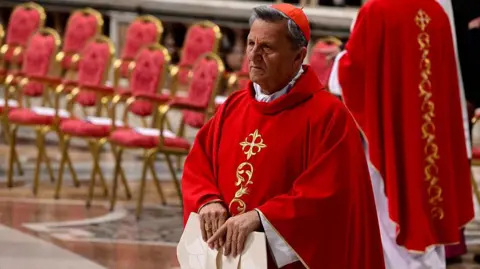
Tiziana FABI/AF
Nationality: Maltese
Age: 68
If cardinals are looking for a candidate who will advance one of Pope Francis' key goals – to place more power in the hands of rank-and-file Catholics – they may look to Cardinal Grech.
Pope Francis made him secretary general of the Synod of Bishops in 2019.
In that role Cardinal Grech became instrumental in helping set in motion the Pope's vision of feeding the opinions of individual believers around the world into the Church's governance.
Like the Pope he worked closely with, Grech is known to have been on a journey in regards to the way he views social issues.
He has changed his tone on homosexuality over the past decade, declaring that Francis' endorsement of same-sex civil unions was a "storm in a teacup".t
Matteo Zuppi
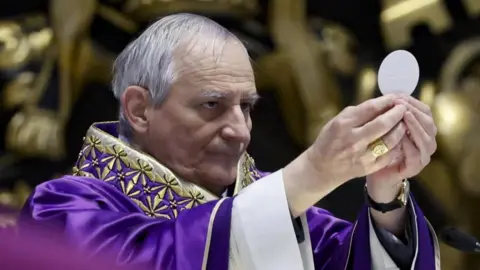
EPA-EFE/REX/Shutterstock
Nationality: Italian
Age: 69
The Archbishop of Bologna grew up in Rome and soon became part of the Sant'Egidio Community, a charity that focuses on the poor and the marginalised.
He helped mediate the end of Mozambique's 15-year civil war in 1990, and took part in further mediation efforts in Guatemala and Burundi.
Made a cardinal in 2019, he was chosen by Pope Francis - ahead of his secretary of state Pietro Parolin - to act as envoy after Russia's full-scale invasion of Ukraine. He travelled to Kyiv and Moscow and sought the release of 19,000 Ukrainian children taken to Russia.
He wrote the introduction to a 2018 book that called on the Church to improve its relationship with LGBT Catholics.
His closeness to Francis may ultimately count against him in the conclave.
Joseph Tobin
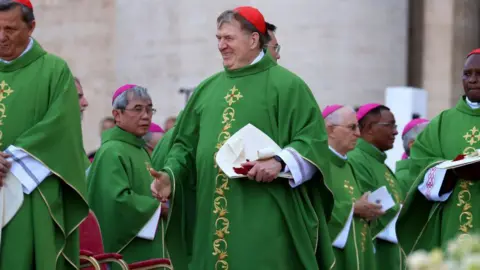
Getty Imagest
Nationality: American
Age: 73
Born in Detroit as the eldest of 13 children, the Archbishop of Newark is well known and popular among cardinals.
Although he is considered a staunch supporter of Francis' views on offering a more open and welcoming Church, he is seen as a unifying figure.
He has in the past deplored political polarisation in the US, warning against divisions in the Church too.
In recent years he has said the Church should welcome same-sex couples and said he does not see a "compelling theological reason why the Pope couldn't name a woman cardinal".
Appointed by Pope Benedict as deputy head of the Vatican office that works with religious orders and their congregations, Tobin also led a religious congregation called the Redemptorists.
He was named as archbishop in Indianapolis, before Francis made him cardinal.
Angelo Scola

Getty Images
Nationality: Italian
Age: 83
Only cardinals under 80 can vote in the conclave, but Angelo Scola could still be elected.
The former Archbishop of Milan was a frontrunner in 2013 when Francis was chosen, but he is thought to have fallen victim to the adage of entering the conclave as Pope and leaving as cardinal.
His name has resurfaced ahead of the conclave, because of a book he is publishing this week on old age. The book features a preface written by Pope Francis shortly before he was admitted to hospital in which he said "death is not the end of everything, but the beginning of something".
Francis's words show genuine affection for Scola, but the college of cardinals might not see his focus on old age as ideal for a new pope.
Reinhard Marx

Getty Images
Nationality: German
Age: 71
Germany's top Catholic cleric is also very much a Vatican insider too.
The Archbishop of Munich and Freising was chosen as an adviser when Francis became pope in 2013. For 10 years he advised the Pope on Church reform and still oversees financial reform of the Vatican.
He has advocated a more accommodating approach towards homosexuals or transgender people in Catholic teaching.
But in 2021 he offered to resign over serious mistakes in tackling child sexual abuse in Germany's Catholic Church. That resignation was rejected by Francis.
Two years ago he left the Council of Cardinals, the Pope's most important advisory body, in what was seen in Germany as a setback for his career in the Church.
Pierbattista Pizzaballa
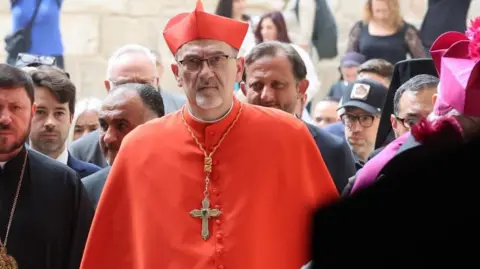
EPA
Nationality: Italian
Age: 60
Ordained in Italy when he was 25, Pizzaballa moved to Jerusalem the following month and has lived there ever since.
Pope Francis made him Latin Patriarch of Jerusalem five years ago and later cardinal, and Pizzaballa has spoken of the city as "the heart of the life of this world".
Fellow cardinals will have been impressed by his deep understanding of Israelis and Palestinians and the ongoing war in Gaza.
However, his relative young age and inexperience as a cardinal may count against him, as could his affinity to Francis among cardinals seeking a change in direction.
Marc Ouellet

Reuter
Nationality: Canadian
Age: 80
Cardinal Ouellet has twice before been seen as a potential candidate for Pope, in 2005 and 2013.
For years he ran the Vatican's Dicastery for Bishops, which chooses candidates for the episcopate around the world, so he has played a significant and formative role in vetting the future members of the Catholic hierarchy.
As another octogenarian, he will not be able to play a part in the conclave itself, which may hinder his chances.
Ouellet is viewed as a conservative with a modern outlook, who is strongly in favour of maintaining the principle of celibacy for priests.
He opposes the ordination of women priests, but he has called for a greater role for women in running the Catholic Church, saying that "Christ is male, the Church is feminine".
Robert Sarah

GUY PETERSON/AFP
Nationality: Guinean
Age: 79
Well-liked by conservatives in the Church, Cardinal Sarah is known for his adherence to doctrine and traditional liturgy and was often considered opposed to Pope Francis's reformist leanings.
The son of a fruit-picker, Sarah became the youngest archbishop aged 34 when Pope John Paul II appointed him prelate in Conakry in Guinea.
He has had a long and impressive career, retiring in 2021 as head of the Vatican's office that oversees the Catholic Church's liturgical rites.
While not considered a favourite for the papacy, he could attract strong support from conservative cardinals.
Jean-Marc Aveline
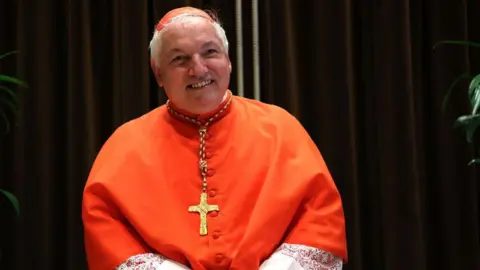
Franco Origlia/Getty Images
Nationality: French
Age: 66
Not since Gregory XI died in 1378 has there been a French pope.
Although born under French colonial rule in Algeria, Aveline grew up in France's second city Marseille, where he later became archbishop.
He has been outspoken on avoiding "criminalisation of immigrants as the cause of all evil", chiming very much with Francis's focus on migrants.
Aveline also set up an Institute of Science and Theology of Religions in Marseille and promoted dialogue with Islam and Judaism. He has spoken out against one of Marseille's biggest problems, drug trafficking networks.
Considered close to Francis, two years ago he brought the Pope to Marseille for a brief visit.
Although he speaks Arabic, one potential drawback is that he does not speak fluent Italian.
Charles Maung Bo
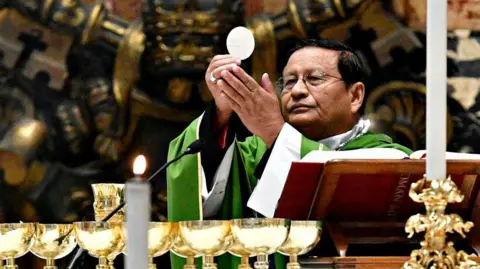
Vatican Pool/Getty Images
Nationality: Myanmar
Age: 76
Another Asian cardinal with strong credentials for the papacy, Bo was brought up in a large family by his mother in a country where only 1.3% of the population are Catholics.
Born in the northern Sagaing region, Cardinal Bo has seen for himself the conflict that has ravaged Myanmar.
He led Asia's bishops for two terms and was considered close to Francis, who named him as Myanmar's first cardinal and became the first pope to visit the country in 2017.
He spoke out over the plight of the Rohingya Muslims who were forced to flee the military in Rakhine state, and said Myanmar should celebrate its diversity
.
Michael Czerny
Who will be the next pope? Key candidates in an unpredictable process
Their choice could have a profound impact on the Catholic Church and the world's 1.4 billion baptised Roman Catholics, and it is harder than ever to predict who it will be.
 ANGELO CARCONI/EPA-EFE/REX/Shutterstock
ANGELO CARCONI/EPA-EFE/REX/ShutterstockNationality: Canadian
Age: 78
Cardinal Czerny was appointed cardinal by Pope Francis and is like him a Jesuit, a leading order of the Catholic Church known for its charitable and missionary work around the world.
Although he was born in the former Czechoslovakia, his family moved to Canada when he was two.
He has worked widely in Latin America and in Africa, where he founded the African Jesuit Aids Network and taught in Kenya.
Czerny is popular with progressives in the Church and was considered close to Pope Francis. He is currently head of the Vatican's Dicastery for Promoting Human Integral Development.
During the pre-conclave period he has warned against calls for "unity" from traditionalist cardinals, suggesting what they really mean is a "reversal" of reforms introduced by Pope Francis.
Although a strong candidate, it seems unlikely the cardinals would choose a second Jesuit pope in succession.



